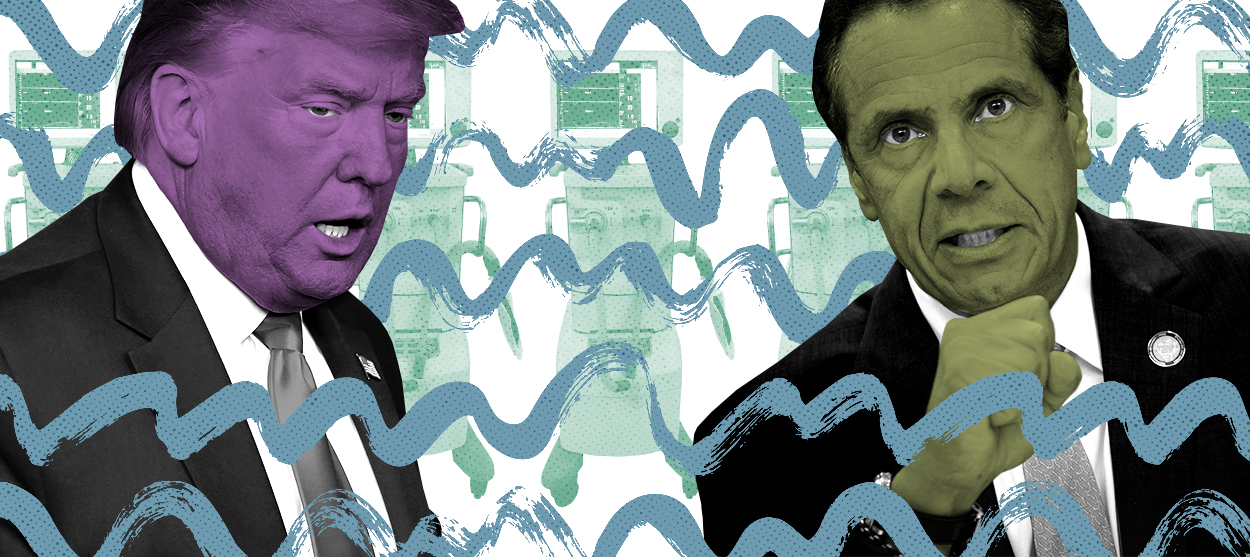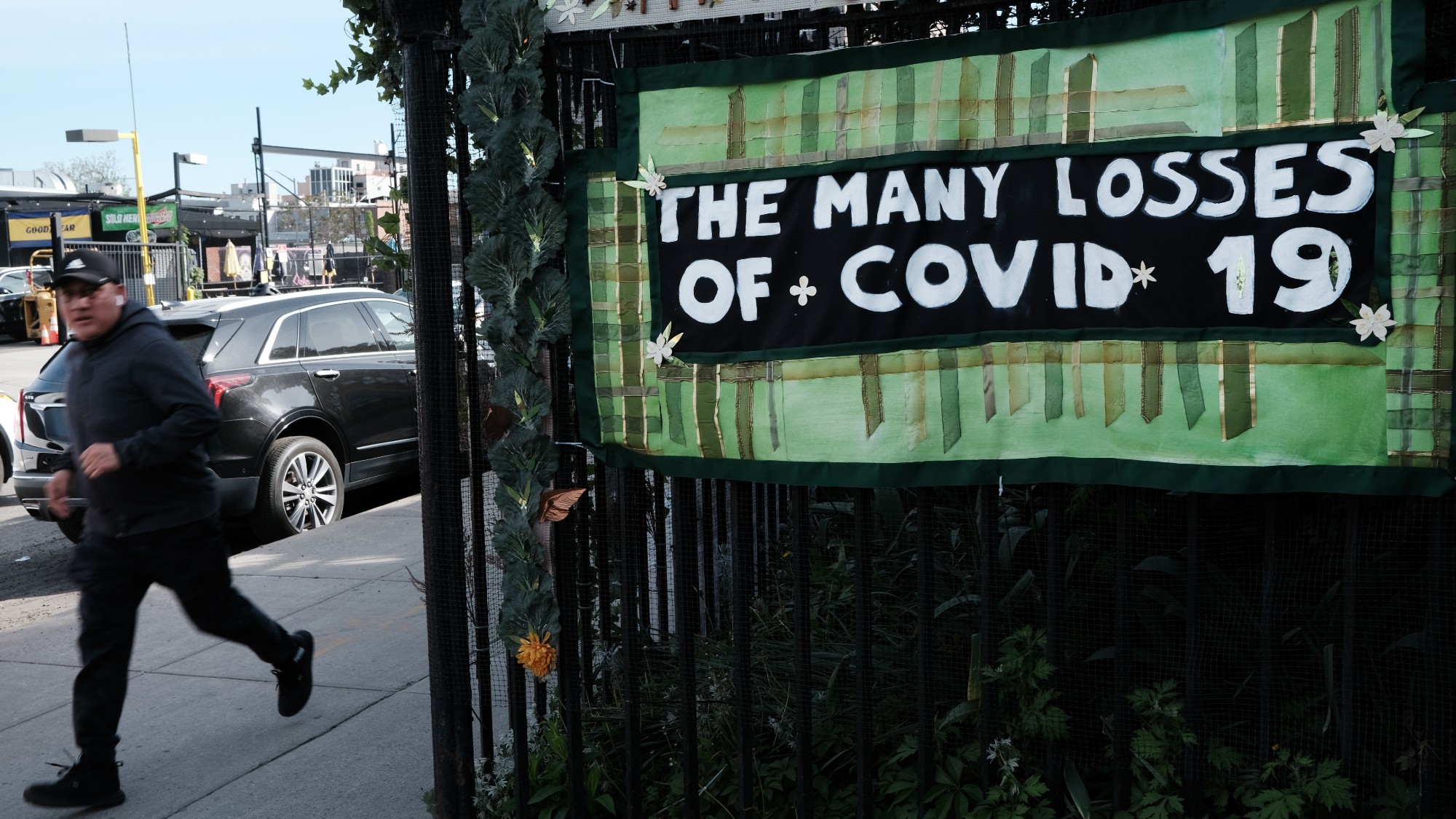Trump's message to blue states battling coronavirus: Drop dead
The president's war with Democratic governors over pandemic response measures is unconscionable. And it's only going to get worse.


A free daily email with the biggest news stories of the day – and the best features from TheWeek.com
You are now subscribed
Your newsletter sign-up was successful
Heading into 2020, it seemed like those online election prediction maps would be the most exciting thing to watch over the coming year. But now, a different map may tell us much more about what the future holds.
While the coronavirus spreads across the nation with no regards to state borders, the nation's governors are taking wildly different approaches to tackling the disease, resulting in a patchwork national map that undermines our ability to stop COVID-19 effectively. Coupled with the disastrous leadership of a president more interested in retaliating against his perceived enemies than employing his powers for good, the fractured response to coronavirus reveals how much has to be healed in our nation's system. It also sets in motion an inevitable showdown between Trump and those state leaders who are taking coronavirus seriously, a divide that is only going to get worse given Trump's toxic tendency to blame others for his own shortcomings.
Trump's sickness was startlingly evident in his interview with Fox News' Bill Hemmer last Tuesday. Asked about his administration's coordination with the states, a basic function of the federal government and a critical one in a crisis moment, Trump's response displayed his typically transactional view of how things get done under his watch. "It's a two-way street," Trump childishly whined, "They have to treat us well, also. They can't say, 'Oh, gee, we should get this, we should get that.'"
The Week
Escape your echo chamber. Get the facts behind the news, plus analysis from multiple perspectives.

Sign up for The Week's Free Newsletters
From our morning news briefing to a weekly Good News Newsletter, get the best of The Week delivered directly to your inbox.
From our morning news briefing to a weekly Good News Newsletter, get the best of The Week delivered directly to your inbox.
That's been Trump's approach to working with others, especially those in need, from the start, a twisted outgrowth of the manipulation tactics he's used throughout his personal and professional life.
As president, his self-interest and demands for personal loyalty always guide his decision making. At the depressingly dysfunctional level, that has meant a revolving door of White House staffers and administration appointees, including Jeff Sessions, who didn't satisfy Trump's insatiable ego enough to stay. At the lawbreaking level, it has meant his bald quid pro quo demand that Ukraine investigate a political rival in order to receive congressionally-mandated foreign aid and putting extreme restrictions on federal aid to Puerto Rico, seemingly in retaliation for how government officials there had criticized his handling of Hurricane Maria.
But where Trump's pay-to-play expectations of Ukraine, despite the Senate's judgments, were unconstitutional, his praise-to-play demands of state governors while the health of the nation hangs in the balance are nothing short of unconscionable. Trump's refusal to take federal action against the virus may be the most disastrous decision of his presidency. His petty privileging of red states and his punishing of blue states may be the most deadly, with consequences for all Americans no matter their politics.
After Andrew Cuomo requested 30,000 ventilators for his coronavirus-ravaged New York, Trump coughed up only 400 machines while, as usual, freely blaming the governor for the state's situation. "You want a pat on the back for sending 400 ventilators," an exasperated Cuomo asked at a recent news conference. "You're missing the magnitude of the problem."
A free daily email with the biggest news stories of the day – and the best features from TheWeek.com
On Thursday, Trump lashed out at Michigan Gov. Gretchen Whitmer for her criticisms of the administration's inaction. "We've had a big problem with the... woman governor," Trump told Fox News' Sean Hannity. "We don't like to see the complaints." He later said he'd told Vice President Mike Pence not to call "the woman in Michigan."
Meanwhile Florida, a state run by a loyal Trump supporter, Gov. Ron DeSantis, has fared better, not surprisingly. Despite DeSantis’ failure to take the disease seriously and limit its escalating spread through the state, Florida has received all the medical supplies it has requested from the federal stockpile, and then some. New Jersey, on the other hand, a state with currently the second highest number of coronavirus cases in the country, initially got only a small fraction of what it requested.
Other Republican state leaders are making Trump's abdication of responsibility even easier, propping up his fantastical and fatalist thinking and actively undercutting public health measures. Trump's arbitrary selection of April 12 as the date he wanted the country "opened up" outraged public health officials who warn we need much more time (he's since backed down to say April 30). But Texas Lt. Gov. Dan Patrick's horrific recent comments that grandparents should be willing to sacrifice their lives for the sake of the economy is merely putting the public voice to the sort of Machiavellian logic shaping red states' policies.
In Mississippi, Republican Gov. Tate Reeves on Wednesday signed an executive order declaring almost all the businesses in the state as "essential," thereby invalidating any local mayors or state agencies that have tried to implement social-distancing requirements. Reeves' decision also included religious facilities, despite an earlier directive by the state's Department of Health that Mississippians avoid church services, weddings, and funerals to help curb the virus' spread.
In other Republican-led states, the continued lack of prohibitions against public gatherings will spell disastrous consequences. Blue states and places like Ohio and Maryland, led by reasonable Republican governors, cannot combat the virus alone. If Trump keeps picking favorite states to help in the absence of a national approach, everyone will lose.
A moment like this requires leadership, but Trump is no leader. Sulking that he can no longer hold the public rallies that give him life, Trump is incapable of rallying the nation in defense of its own. With potentially millions of Americans at risk of dying from coronavirus, Trump's only interest, as always, is in tending to his bruised ego, and he'll ruthlessly play governors against each other to fulfill his needs.
In his Friday press conference, Trump told reporters, "All I want [governors] to do... I want them to be appreciative. We've done a great job." All those governors want is a president who cares about the lives of their constituents, regardless of whether they voted for him.
Want more essential commentary and analysis like this delivered straight to your inbox? Sign up for The Week's "Today's best articles" newsletter here.
Neil J. Young is a historian and the author of We Gather Together: The Religious Right and the Problem of Interfaith Politics. He writes frequently on American politics, culture, and religion for publications including The New York Times, The Atlantic, the Los Angeles Times, HuffPost, Vox, and Politico. He co-hosts the history podcast Past Present.
-
 A dreamy long weekend on the Amalfi Coast
A dreamy long weekend on the Amalfi CoastThe Week Recommends History, pasta, scenic views – this sun-drenched stretch of Italy’s southern coast has it all
-
 Can foster care overhaul stop ‘exodus’ of carers?
Can foster care overhaul stop ‘exodus’ of carers?Today’s Big Question Government announces plans to modernise ‘broken’ system and recruit more carers, but fostering remains unevenly paid and highly stressful
-
 6 exquisite homes with vast acreage
6 exquisite homes with vast acreageFeature Featuring an off-the-grid contemporary home in New Mexico and lakefront farmhouse in Massachusetts
-
 The billionaires’ wealth tax: a catastrophe for California?
The billionaires’ wealth tax: a catastrophe for California?Talking Point Peter Thiel and Larry Page preparing to change state residency
-
 Bari Weiss’ ‘60 Minutes’ scandal is about more than one report
Bari Weiss’ ‘60 Minutes’ scandal is about more than one reportIN THE SPOTLIGHT By blocking an approved segment on a controversial prison holding US deportees in El Salvador, the editor-in-chief of CBS News has become the main story
-
 Has Zohran Mamdani shown the Democrats how to win again?
Has Zohran Mamdani shown the Democrats how to win again?Today’s Big Question New York City mayoral election touted as victory for left-wing populists but moderate centrist wins elsewhere present more complex path for Democratic Party
-
 Millions turn out for anti-Trump ‘No Kings’ rallies
Millions turn out for anti-Trump ‘No Kings’ ralliesSpeed Read An estimated 7 million people participated, 2 million more than at the first ‘No Kings’ protest in June
-
 Ghislaine Maxwell: angling for a Trump pardon
Ghislaine Maxwell: angling for a Trump pardonTalking Point Convicted sex trafficker's testimony could shed new light on president's links to Jeffrey Epstein
-
 The last words and final moments of 40 presidents
The last words and final moments of 40 presidentsThe Explainer Some are eloquent quotes worthy of the holders of the highest office in the nation, and others... aren't
-
 The JFK files: the truth at last?
The JFK files: the truth at last?In The Spotlight More than 64,000 previously classified documents relating the 1963 assassination of John F. Kennedy have been released by the Trump administration
-
 'There is a certain kind of strength in refusing to concede error'
'There is a certain kind of strength in refusing to concede error'instant opinion 'Opinion, comment and editorials of the day'
